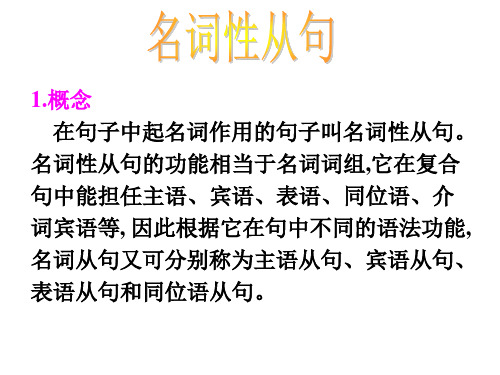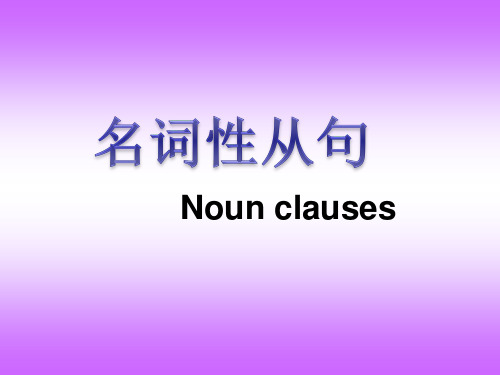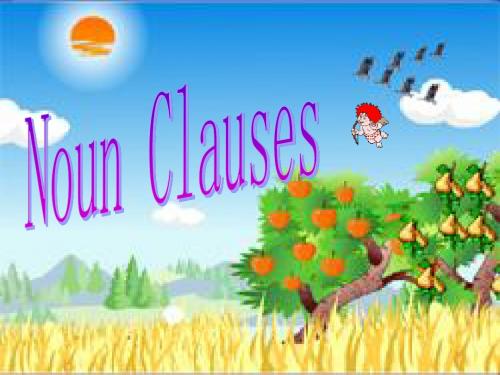名词性从句的用法PPT课件
合集下载
名词性从句PPT课件

1.概念 在句子中起名词作用的句子叫名词性从句。
名词性从句的功能相当于名词词组,它在复合 句中能担任主语、宾语、表语、同位语、介 词宾语等, 因此根据它在句中不同的语法功能, 名词从句又可分别称为主语从句、宾语从句、 表语从句和同位语从句。
Who will win the match is still unknown.
whichever (book) you like.
whose
• Whose表示“谁的”。 • 在句子中充当定语的成分,其后一定会加
when, where, how, why, however… when, where, how, why, however…
that的用法
• 在从句中不充当任何成分,也没有任何具体意思。 • 引导的句子相当于一个陈述句。 • 只起到连接的作用。
主语 做及物动词宾语
宾语 做介词宾语
表语 同位语
一般不省略 可以省略 不可以省略 一般不省略 一般不省略
(3) It + 不及物动词+从句 It seems that… 似乎… It happened that… 碰巧… It appears that… 似乎…
(4) It is + 过去分词+从句 It is reported that… 据报道… It has been proved that… 已证实… It is said that… 据说…
He doesn’t know whether to stay or not. E) 后面紧接or not 时。如:
We didn’t know whether or not she was ready.
② 关联词只能用 whether或if, 不能用 that的情况如下:
名词性从句的功能相当于名词词组,它在复合 句中能担任主语、宾语、表语、同位语、介 词宾语等, 因此根据它在句中不同的语法功能, 名词从句又可分别称为主语从句、宾语从句、 表语从句和同位语从句。
Who will win the match is still unknown.
whichever (book) you like.
whose
• Whose表示“谁的”。 • 在句子中充当定语的成分,其后一定会加
when, where, how, why, however… when, where, how, why, however…
that的用法
• 在从句中不充当任何成分,也没有任何具体意思。 • 引导的句子相当于一个陈述句。 • 只起到连接的作用。
主语 做及物动词宾语
宾语 做介词宾语
表语 同位语
一般不省略 可以省略 不可以省略 一般不省略 一般不省略
(3) It + 不及物动词+从句 It seems that… 似乎… It happened that… 碰巧… It appears that… 似乎…
(4) It is + 过去分词+从句 It is reported that… 据报道… It has been proved that… 已证实… It is said that… 据说…
He doesn’t know whether to stay or not. E) 后面紧接or not 时。如:
We didn’t know whether or not she was ready.
② 关联词只能用 whether或if, 不能用 that的情况如下:
高考英语语法完全讲解——名词性从句课件(共17张PPT)

三、what/whatever与
which/whichever的区别
what/whatever意为“什么/无论什么”,描述的事物在上下 文中没有范围;which/whichever意为“哪个/无论哪个”, 描述的事物在上下文中有范围。 To be honest, I can hardly understand what/whatever you have said. Here is the dress. This is what I have been dreaming of. Here are many beautiful dresses. You can choose whichever you like.
高考英语语法完全讲解 名词性从句
定义及分类
在句中起到名词所能充当的句子成分的从句称之 为名词性从句,名词常用来作主语、宾语、表语、 同位语,因此,对应的名词性从句可以分为四大 类:主语从句、宾语从句、表语从句、同位语从 句。
主句从句
1、作句子主语的从句叫作主语从句。 2、为避免句子头重脚轻,常用形式主语it代替主语从 句,把主语从句置于句尾。常用的句型有:It is/was+ 形容词/名词/过去分词+that从句。
表语从句
位于系动词之后作表语的从句叫表语从句。 The problem is who is to pay and when we can start.
同位语从句
同位语从句说明其前面名词的具体内容。通常由that引 导,常接同位语从句的名词有:news, conclusion, possibility, rumor, certainty, story, word, mystery, idea, doubt, hope, truth, question, belief, fact, message, evidence, information, explanation, rule, probability, question, wish, thought, statement, report, opinion, principle等。
超实用高考英语复习:名词性从句课件

高考质量提升是一项系统工程,涉及到多个方面、各个维度,关键是要抓住 重点、以点带面、全面突破,收到事半功倍的效果。
一、备考策略务必精准
高三备考的不同阶段,目标和任务各不相同,就像打仗一样,攻克不同的 山头有不同的打法,只有抓住要领,才能打赢主动仗。 一是细化“作战地图”
从现在到一模考试前,主要任务是过课本、串教材,把基础知识再夯实, 为专题复习奠定坚实基础。各学科组教师要认真学习新课程、新课标、《中国 考试评价体系及说明》和近三年高考原题,把高考考点和试题变化点做成“作战 地图”,平时考试、练习要对照“作战地图”进行选题,并在“作战地图”上一一标 注,确保考点训练无死角、考点覆盖无遗漏。 二是组织集体攻坚
注意:由what,whatever,whoever等引导的主语从句一般不能用it作形式主语。
表语从句
• 表语从句在句中充当表语,位于主句系动词之后。 The question is who can complete the difficult task.
• 表语从句可用whether引导,也可用as if/though 引导,但不用if引导。 His first question was whether Tom had arrivrd yet. He looked as if he wanted to remember all the things in the room. • 当主句主语是reason时,表语从句的连接词用that而不用because。 区分: That’s why......+结果 That’s because......+原因 The reason why/for...is/was that...
从句,why在从句中充当原因状语。) • Can you find out how to solve the problems?(how 引导介词宾语从句,
名词性从句公开课ppt课件

考点一 连接词 that / what 的选用
总结归纳:
that 和 what 都可引导所有的 名词性从句。但是,_w_h_a_t__除起连 接作用外,还在名词性从句中充当 成分,可作从句的_主_语__、_宾_语__、 _表___语___、或_定__语_。而_th_a_t__在名词性从 句中不充当任何成分,只起 __连__接___作用。
• 步骤二:如果从句中既不缺少主语,宾语, 表语,定语,但是缺少一定意义的状语, 则考虑用连接副词;
• 步骤三:如果既不缺少主语,宾语,表语, 定语,也不缺少状语,则考虑用从属连词。
基础回顾2
Conjunctions of Noun Clauses
从属连词
有词义, 但不做成分
that(无词义), whether, if as if/as though
考点一 连接词 that / what
Fans believe _t_h_a_t_ Jinyong's death is definitely a huge loss to the wuxia world. However, there is a saying _th__a_t _ where there are Chinese people, there are kungfu legends. _W__h_a_t we can do is to may he rest in peace and remember him forever.
宾语从句 表语从句
同位语从句
·
主语从句
• That anti-China separatists try to destroy the city is the biggest threat for HongKong.
名词性从句 ppt

See to it that children don’t catch cold
宾语从句的 2)连接代词: who, whose, what, which
3)连接副词: when, where, how, why
She told me that she would accept my invitation. I wonder whether you can change this note for me.
2.作介词的宾语 Our success depends upon how well we can cooperate with one another. 3. It作为形式宾语 He has made it clear that he will not give in.
1)动词如make,find,think,feel,consider,believe等 后面有宾补时,可用结构 make/find等+it+宾补 (adj/n)+宾语从句。 I think it necessary that we take plenty of boi -led water every day.
3.宾语从句的时态 1)主句用过去时,且从句中有具体的时间状语 则用过去式(如从句表示客观真理,可用现在时)
He said he was born in 1980. Yesterday Tom said that the earth goes round the sun. 2)主句为现在时时,从句可根据需要选用各种时态 I think that the Green’s have left for Hawaii. I want to know if/whether he will go surfing this afternoon.
宾语从句的 2)连接代词: who, whose, what, which
3)连接副词: when, where, how, why
She told me that she would accept my invitation. I wonder whether you can change this note for me.
2.作介词的宾语 Our success depends upon how well we can cooperate with one another. 3. It作为形式宾语 He has made it clear that he will not give in.
1)动词如make,find,think,feel,consider,believe等 后面有宾补时,可用结构 make/find等+it+宾补 (adj/n)+宾语从句。 I think it necessary that we take plenty of boi -led water every day.
3.宾语从句的时态 1)主句用过去时,且从句中有具体的时间状语 则用过去式(如从句表示客观真理,可用现在时)
He said he was born in 1980. Yesterday Tom said that the earth goes round the sun. 2)主句为现在时时,从句可根据需要选用各种时态 I think that the Green’s have left for Hawaii. I want to know if/whether he will go surfing this afternoon.
名词性从句PPT课件

语态:被动语态和主动语态
被动语态
表示动作的接受者是主语,如 "The book was written by him."中的主语从句"The book was written"使用被动语态。
主动语态
表示动作的执行者是主语,如 "He wrote the book."中的主语 从句"He wrote the book"使用 主动语态。
抽象名词翻译
在汉译英时,有时需要将具体 名词抽象化,以使译文更加符
合英语表达习惯。
THANKS FOR WATCHING
感谢您的观看
04 名词性从句的特殊结构
it作形式主语
形式主语用于代替主 语从句,避免句子结 构不平衡。
It is important that we should learn English well.
It is+形容词/名词 +that+主语从句。
强调句型中的名词性从句
01
It
is/was+被强调部分
+that/who+句子其余部分。
表示现在的动作或状态,如"I know who he is."中的宾语 从句"who he is"使用现在时态。
过去时态
表示过去的动作或状态,如"He said that he was a student."中的宾语从句"he was a student"使用过去时态。
将来时态
表示将来的动作或状态,如"I will tell you what will happen."中的宾语从句"what will happen"使用将来时态。
名词性从句公开课课件

05
名词性从句在写作中的应用
在句子中添加细节信息
总结词
名词性从句能够提供更多的细述
在写作中,我们有时需要提供更多的细节信息来支持主句的 观点或描述。名词性从句,如定语从句和名词性主语从句, 可以用来补充相关的信息和细节,使句子更加完整和具体。
表达观点和立场
语态
主动语态
表示主语是动作的执行者。例如 :She wrote a letter.
被动语态
表示主语是动作的承受者。例如 :The letter was written by her.
04
名词性从句的特殊用法
as引导的名词性从句
总结词:指代内容
详细描述:as可以作为关系代词,引导定语从句,指代整个主句的内容,表示“ 像……一样”。
总结词
名词性从句可以用来连接句子和段落,使文 章更加连贯和流畅。
详细描述
在写作中,我们经常需要将不同的句子和段 落连接起来,以使文章更加连贯和流畅。名 词性从句,特别是状语从句和定语从句,可 以用来连接句子和段落,使文章更有条理。 通过使用名词性从句,我们可以更好地组织 文章的结构,使读者更容易理解我们的思路 和观点。
特点
示例
He studies hard, which is known to us all.
在从句中充当句子成分,表示“其中 的……”。
who/whom的用法
定义
who/whom用作连词时,引导名词性从句,是关系代词型的连接 词,用于指代人。
特点
who在从句中充当主语或宾语,whom只能充当宾语。
whether引导的名词性从句
总结词:选择内容
详细描述:whether可以引导名词性从句,表示选择内容,常用于表示“是否”的意思。
名词性从句优秀PPT课件

解析
A选项中“What”引导的是主语 从句,表示“他说的话不是真实 的”。B选项中“Who”引导的 是主语从句,表示“谁将去参加 会议还不知道”。C选项中 “Why”引导的是主语从句,表 示“他为什么离开学校还是一个 谜”。
THANKS
感谢观看
whom的用法
引导定语从句,相当于“whom”
引导名词性从句,相当于“who”
whose的用法
引导定语从句,表示“谁的”
引导名词性从句,表示“谁的”
which的用法
01
引导定语从句,相当于 “which”
02
引导名词性从句,相当于 “which”
03
名词性从句的时态与语序
时态的用法
一般现在时
A选项中“It is strange that…”是一个固定句型, 表示“奇怪的是…”,其中 that引导的从句是主语从句 。B选项中“It is a pity that…”也是一个固定句型 ,表示“遗憾的是…”,其 中that引导的从句是主语从 句。C选项中“where”引 导的是地点状语从句,表示 “在哪里”。
解决方案
在编写或修改名词性从句时,要特别注意主谓一致的问题,确保主语和谓语在 单复数形式上保持一致。
从句中的时态错误
时态不一致
在描述过去、现在或未来的事件时,时态的使用是关键。例 如,“If I was younger, I would do it”中,“was”与 “would do”之间存在时态不一致的错误。
用于表达过去某个时间正 在进行的动作。
时态的用法
过去完成时
用于表达过去的过去,即过去某个时 间之前发生的动作或状态。
过去完成进行时
用于表达过去的过去,即过去某个时 间之前正在进行的动作。
新航道雅思语法名词性从句PPT课件

从句过于冗长复杂,影响阅读理解,应尽量简化 表达,如“The cat that was sitting on the mat was black.”应改为“The black cat was sitting on the mat.”
THANKS
感谢观看
主语从句
定义
用作主语的从句叫做主语从句。
构成
关联词+简单句。
关联词类型
1. 陈述句用that;2. 一般疑问句用whether;3.特殊疑问句用疑问词。
注意事项
1. 主语从句不可省略;2. 主语从句不可用逗号与后面的句子分开;3. 主句主语和从句主语一致,从句可直接放在句尾,不用连接词。
宾语从句
被动语态的使用
在需要强调动作承受者时,可以使用被动语态,使句子更加 清晰明了。
05
名词性从句在雅思写作中的应用
写作中常用的名词性从句类型
主语从句
用作主语的名词性从句,如 “What he said is not true.”
宾语从句
用作宾语的名词性从句,如“I believe that climate change is real.”
引导词错误
使用了错误的引导词,如“I think that you are right, because you are always right.”应改为 “I think that you are right, because of your excellent performance.”
从句冗长复杂
新航道雅思语法名词性从 句ppt课件
• 名词性从句概述 • 名词性从句的构成 • 名词性从句的引导词 • 名词性从句的特殊用法 • 名词性从句在雅思写作中的应用
THANKS
感谢观看
主语从句
定义
用作主语的从句叫做主语从句。
构成
关联词+简单句。
关联词类型
1. 陈述句用that;2. 一般疑问句用whether;3.特殊疑问句用疑问词。
注意事项
1. 主语从句不可省略;2. 主语从句不可用逗号与后面的句子分开;3. 主句主语和从句主语一致,从句可直接放在句尾,不用连接词。
宾语从句
被动语态的使用
在需要强调动作承受者时,可以使用被动语态,使句子更加 清晰明了。
05
名词性从句在雅思写作中的应用
写作中常用的名词性从句类型
主语从句
用作主语的名词性从句,如 “What he said is not true.”
宾语从句
用作宾语的名词性从句,如“I believe that climate change is real.”
引导词错误
使用了错误的引导词,如“I think that you are right, because you are always right.”应改为 “I think that you are right, because of your excellent performance.”
从句冗长复杂
新航道雅思语法名词性从 句ppt课件
• 名词性从句概述 • 名词性从句的构成 • 名词性从句的引导词 • 名词性从句的特殊用法 • 名词性从句在雅思写作中的应用
50_专题十 名词性从句

考点清单 栏目索引
用法精讲
名词性从句包括主语从句、宾语从句、表语从句和同位语从句,从句要 用陈述句语序。名词性从句的引导词如下表所示:
引导词
从属 连词
that whether, if
because
连接 who(ever),whom, what(ever), whose, which(ever) 代词
答案 Whatever 句意:你的支持对我们的工作很重要。你做的任何事
情都有帮助。本题考查主语从句。“
you can do”为主语从句,
该从句缺少宾语,且表示“任何事情”,故答案为Whatever(相当于Any-
thing that)。
考点清单 栏目索引
3.We choose this hotel because the price for a night here is down to $20, half of what it used to charge. 答案 what 句意:我们选择这家宾馆是因为这里住一晚上的价格降到 了20美元,(20美元)是其过去收费的一半。本题考查宾语从句。逗号后 面是$20的同位语,charge后面缺少宾语,故用what引导。
考点清单 栏目索引
3.与or not连用时用whether。 I didn't know whether or not he had passed the test. 我不知道他是否已经 通过了测试。
考点清单 栏目索引
4.主语从句、表语从句、同位语从句中使用whether。 Whether the meeting will be called off has not been decided yet.会议是否 会被取消还没有决定。 The question is whether they can finish the task on schedule. 问题是他们 能否按时完成任务。
名词性从句高考复习课件

名词性从句高考复习课件
本课件将详细介绍名词性从句的定义和类型,以及它们与主语从句、宾语从 句、表语从句和同位语从句的区别。我们还将总结名词性从句的引导词及使 用方法,并提供高考考点和解题技巧。
名词性从句的定义和类型
名词性从句是在复合句中充当名词一样的成分,有三种类型:主语从句、宾语从句和同位语从句。掌握 这些类型对于理解复杂句子的结构至关重要。
名词性从句的引导词及其用法总结
引导词 作为主语从句的引导词 作为宾语从句的引导词 作为表语从句和同位语从句的引导词
用法 that, whether that, whether, if that
名词性从句在高考中的考点和解题技巧
高考常考名词性从句作为主语从句、宾语从句和表语从句,需掌握解题技巧,如平行结构、倒装和省略 等。理解并熟练运用名词性从句,对提高语文成绩具有重要意义。
名词性从句和主语从句的区别
1
名词性从句
在句中充当名词
2
主语从句
,而主语从句只能充当主语。
名词性从句和宾语从句的区别
名词性从句
在句中充当宾语
宾语从句
在句中充当动词的宾语
区别
名词性从句可以充当句子的任 何成分,而宾语从句只能作为 动词或介词的宾语。
名词性从句和表语从句的区别
名词性从句
在句中充当名词
表语从句
在句中充当表语
区别
名词性从句可作为句子的任 何成分,而表语从句只能作 为谓语动词的补充。
名词性从句和同位语从句的区别
1 名词性从句
在句中充当名词
2 同位语从句
在句中充当同位语
3 区别
名词性从句可作为句子的任何成分,而同位语从句只能修饰名词。
名词性从句导入语法讲解课件

03
名词性从句的句法功能
主语从句
主语从句在句子中充当主语成分,表达完整意义。
主语从句通常位于句子的开始位置,引导整句话的内容,表达完整的意义。主语 从句可以由连词、关系代词或关系副词引导,例如:When he comes back, we will have dinner.(时间状语从句引导的主语从句)
表语从句
表语从句在句子中充当表语成分,补充说明主语的性质、状 态或特征。
表语从句通常位于系动词之后,如be动词、感官动词等,用 于补充说明主语的性质、状态或特征。表语从句可以由连词 、关系代词或关系副词引导,例如:My idea is that we should start right away.(表语从句)
名词性从句的作用
表达复杂的概念或信息
修饰主句
名词性从句可以用来表达复杂的概念 或信息,使句子更加丰富和具体。
名词性从句可以用来修饰主句,使主 句的含义更加明确和具体。
连接句子
名词性从句可以用来连接两个句子, 使它们成为一个有机的整体。
02
引导名词性从句的关联词
that的用法
引导主语从句、宾语从句、表语 从句和同位语从句,在从句中不 充当任何成分,只起连接作用。
宾语从句
宾语从句在句子中充当宾语成分,完整呈现句子所表达的 对象或内容。
宾语从句通常位于及物动词或介词之后,完整呈现句子所 表达的对象或内容。宾语从句可以由连词、关系代词或关 系副词引导,例如:I don't know what he said.(宾语 从句)
同位语从句
同位语从句在句子中充当同位语成分,对名词或代词进行解释或补充说明。
同位语。
特点
具有名词的语法功能,可以独立存 在,也可以作为其他句子的成分。
[名词性从句](共64张PPT)
](https://img.taocdn.com/s3/m/665db3c47e192279168884868762caaedd33ba35.png)
(1) Lily wanted to know ______w__h_e_thher/ gifrandma
liked the handbag .
(2) Let’s see _w_h_e_t_h_e_r_/_if__ we can find out some information about that city . (3) She asked me _____w__h_e_t_h_ers/ hife could borrow these books .
c. whether to do 做动词宾语不能用if to do.
• 2I)diof可n’t以k引no导w条wh件e状the语r 从to句te,ll hwimheatbhoeur无t th此is. 用法。
If you are to succeed, you ought to work harder.
(come)
2. 如果主句是过去的时态(包括一般过去时,过
去进行时),那么从句的时态一定要用相对应的过
去的某种时态(包括一般过去时,过去进行时,过
去将来时,过去完成时)
I knew who __l_iv_e_d__ here. (live) I saw she w__a_s_ta_l_k_in_g__w_it_h_ her mother. (talk) He asked whether his father _______________ twoomuoldrrocwo.m(ceobmaeckback) He said that he __h_a_d_s_e_e_nit before. (see) 3.当从句是客观真理,定义,公理,定理时用一般现 在时。 He said the earth __t_r_a_v_e_lsaround the sun.(travel)
liked the handbag .
(2) Let’s see _w_h_e_t_h_e_r_/_if__ we can find out some information about that city . (3) She asked me _____w__h_e_t_h_ers/ hife could borrow these books .
c. whether to do 做动词宾语不能用if to do.
• 2I)diof可n’t以k引no导w条wh件e状the语r 从to句te,ll hwimheatbhoeur无t th此is. 用法。
If you are to succeed, you ought to work harder.
(come)
2. 如果主句是过去的时态(包括一般过去时,过
去进行时),那么从句的时态一定要用相对应的过
去的某种时态(包括一般过去时,过去进行时,过
去将来时,过去完成时)
I knew who __l_iv_e_d__ here. (live) I saw she w__a_s_ta_l_k_in_g__w_it_h_ her mother. (talk) He asked whether his father _______________ twoomuoldrrocwo.m(ceobmaeckback) He said that he __h_a_d_s_e_e_nit before. (see) 3.当从句是客观真理,定义,公理,定理时用一般现 在时。 He said the earth __t_r_a_v_e_lsaround the sun.(travel)
高中名词性从句专题课件

高中名词性从句专题课件
欢迎来到我的高中名词性从句课件!在这里,您将深入了解名词性从句的定 义、分类、引导词和用法。我们将一步步带您学习各种类型的名词性从句, 以便您在英语学习中能够更加游刃有余。
概述
名词性从句的定义及功能
名词性从句是由一个句子担任一 个名词在另一个句子中的成分。
名词性从句的分类
名词性从句分为主语从句、宾语 从句、表语从句、同位语从句。
基本规律
不同类型的名词性从 句在句子中的语法功 能不同,使用时要根 据需要选择合适的引 导词。
注意点
应注意名词性从句与 定语从句的区别,注 意引导词的含义,避 免使用错误用。
表语从句
表语从句的定义及功能
表语从句作为系动词的补足语,用以表达主语 的特征或状态。
表语从句的句式结构和用法
表语从句应放置在系动词之后,具体用法与系 动词相关。
表语从句的引导词
表语从句的引导词有that, whether, who, what等。
表语从句的特殊情况
表语从句中who, whom, whose作为主语时应将 谓语动词的人称和数保持一致。
同位语从句
同位语从句的定义及功能
同位语从句用作名词的同位语或 解释说明它所修饰的那个名词。
同位语从句的引导词
同位语从句的引导词常有 whether, who, what, whose, which, when等疑问词。
主语从句的特殊情况
主语从句作为there be句型的主语时应把描写主 语的形容词或副词放在be动词之后。
宾语从句
1
宾语从句的定义及功能
宾语从句是作为宾语成分的名词性从句。
2
宾语从句的引导词
宾语从句的引导词有that, whether, if, what, how, who, whom等。
欢迎来到我的高中名词性从句课件!在这里,您将深入了解名词性从句的定 义、分类、引导词和用法。我们将一步步带您学习各种类型的名词性从句, 以便您在英语学习中能够更加游刃有余。
概述
名词性从句的定义及功能
名词性从句是由一个句子担任一 个名词在另一个句子中的成分。
名词性从句的分类
名词性从句分为主语从句、宾语 从句、表语从句、同位语从句。
基本规律
不同类型的名词性从 句在句子中的语法功 能不同,使用时要根 据需要选择合适的引 导词。
注意点
应注意名词性从句与 定语从句的区别,注 意引导词的含义,避 免使用错误用。
表语从句
表语从句的定义及功能
表语从句作为系动词的补足语,用以表达主语 的特征或状态。
表语从句的句式结构和用法
表语从句应放置在系动词之后,具体用法与系 动词相关。
表语从句的引导词
表语从句的引导词有that, whether, who, what等。
表语从句的特殊情况
表语从句中who, whom, whose作为主语时应将 谓语动词的人称和数保持一致。
同位语从句
同位语从句的定义及功能
同位语从句用作名词的同位语或 解释说明它所修饰的那个名词。
同位语从句的引导词
同位语从句的引导词常有 whether, who, what, whose, which, when等疑问词。
主语从句的特殊情况
主语从句作为there be句型的主语时应把描写主 语的形容词或副词放在be动词之后。
宾语从句
1
宾语从句的定义及功能
宾语从句是作为宾语成分的名词性从句。
2
宾语从句的引导词
宾语从句的引导词有that, whether, if, what, how, who, whom等。
名词性从句ppt

Object Clauses 宾语从句
一、连词(引导词) 1. 当宾语从句是陈述句时(包括肯定句和 否定句),连词由 that 引导,因为 that 在从 句中不作任何成分,也没有任何具体意思, 因此在口语或非正式文体中常省略
She says (that) she won’t take part in theLeabharlann Practice time
if / whether she had a 1. I asked her __________ bike. whether he is 3. We’re worried about ________ safe. whether /if 4. I don’t know ___________ he is well or not. whether or not he is 5. I don’t know ________ well. whether to go. 8. I don’t know _______
(我认为这件衣服不适合你穿。)
3. it常可以放在动词think, find, consider, believe, feel, make等后作为形式宾语:it 不仅可以作为形式主语,还可以作为 形式宾语而真正的宾语-that从句则放 在句尾,特别是在带复合宾语的句子中。 We heard it that she would get married next month.
Subject clause Object clause Object clause after a preposition Predictive clause Appositive clause
Practice time:指出下列各名词性从句的种类
- 1、下载文档前请自行甄别文档内容的完整性,平台不提供额外的编辑、内容补充、找答案等附加服务。
- 2、"仅部分预览"的文档,不可在线预览部分如存在完整性等问题,可反馈申请退款(可完整预览的文档不适用该条件!)。
- 3、如文档侵犯您的权益,请联系客服反馈,我们会尽快为您处理(人工客服工作时间:9:00-18:30)。
名词性从句的用法
2020/10/13
1
• 名词性从句包括主语从句,表语从句,宾 语从句和同位语从句。根据这些从句的共 同特性,名词性从句的连词主要可以分成 三类:that, if/ whether和wh-(疑问词)。
• 1.如果一个陈述句被用来作为另一个句子 的主语、表语、宾语或同位语,那么我们 一般要用that作为连词。that本身在句子中 没有意思,只起连接作用。
关于if与whether:两者都可引导宾语从句, 常可换用;但若引导主语从句,则用 whether(不用if),
2020/10/13
4
一般疑问句:Shall we have a meeting this afternoon?
主语从句:Whether we shall have a meeting this afternoon hasn’t been decided yet. 或:It hasn’t been decided yet whether we shall have a meeting this afternoon.
2. 作介词的宾语 例如:Our success depends upon how well we can cooperate
with one another. • 3. 作形容词的宾语
2020/10/13
2
主语从句:That science is developing very fast is known to all.
表语从句:The fact is that science is developing very fast.
宾语从句:Everyone knows that science is developing very fast.
表语从句:The question is whether we shall have a meeting this afternoon.
宾语从句:Do you know whether we shall have a meeting this afternoon?
同位语从句:None of us can answer the question whether we shall have a meeting this afternoon.
That mayor will visit our school next week is said (wrong) It happened, it occurred 也不能 It occurred to me that I failed to examination. It doesn’t matter how/whether也不能 It doesn’t matter whether he is right or not.
It’s a pity that you did not go to see the film. It’s in the morning that murder took place(强调句,与其的区别) 但也有主语从句不能放在句首的情况
It is said that the mayor will visit our school next week (right)
2020/10/13
5
3. 如果一个特殊疑问句被用来作为另一个句 子主语、表语、宾语或同位语,那么我们 就保留原来的疑问词作为连词,这些疑问 词的意思也保留在从句中。变成名词性从 句之后,原来的疑问句的词序要改成陈述 句的词序(主语+谓语)
2020/10/13
6
• 特殊疑问句:Why did the river be polluted? • 主语从句:Why the river was polluted
.
2020/10/138 Nhomakorabea• 宾语从句就是在复合句中作宾语的名词性从句,通常放在主句谓语 动词(及物动词)或介词之后。
• 1. 作动词的宾语 (1) 由that引导的宾语从句(that 通常可以省略),例如: I heard that he joined the army. (2) 由what, whether (if) 引导的宾语从句,例如: 1) She did not know what had happened. 2) I wonder whether you can change this note for me. (3) 动词+间接宾语+宾语从句。例如: She told me that she would accept my invitation.
同位语从句:The fact that science is developing very fast is known to all
2020/10/13
3
2.如果一个一般疑问句被用来作为另一个句 子的主语、表语、宾语或同位语,那么我 们要用whether或if作为连词。whether/ if在 句子中的意思是“是否”。变成名词性从 句后,原来的疑问句的词序要改成陈述句 的词序(主语+谓语)。
must be found out immediately.
• 表语从句:The problem is why the river was polluted .
• 宾语从句:Scientists are trying to find out why the river was polluted .
• 同位语从句:Scientists are trying to solve the problem why the river was polluted .
2020/10/13
7
陈述句:Science is developing very fast. 主语从句:That science is developing very fast is known to all. 通常主语从句用it做形式主语来表达,而真正的主语放在后面 It is known to all that science is developing very fast.
2020/10/13
1
• 名词性从句包括主语从句,表语从句,宾 语从句和同位语从句。根据这些从句的共 同特性,名词性从句的连词主要可以分成 三类:that, if/ whether和wh-(疑问词)。
• 1.如果一个陈述句被用来作为另一个句子 的主语、表语、宾语或同位语,那么我们 一般要用that作为连词。that本身在句子中 没有意思,只起连接作用。
关于if与whether:两者都可引导宾语从句, 常可换用;但若引导主语从句,则用 whether(不用if),
2020/10/13
4
一般疑问句:Shall we have a meeting this afternoon?
主语从句:Whether we shall have a meeting this afternoon hasn’t been decided yet. 或:It hasn’t been decided yet whether we shall have a meeting this afternoon.
2. 作介词的宾语 例如:Our success depends upon how well we can cooperate
with one another. • 3. 作形容词的宾语
2020/10/13
2
主语从句:That science is developing very fast is known to all.
表语从句:The fact is that science is developing very fast.
宾语从句:Everyone knows that science is developing very fast.
表语从句:The question is whether we shall have a meeting this afternoon.
宾语从句:Do you know whether we shall have a meeting this afternoon?
同位语从句:None of us can answer the question whether we shall have a meeting this afternoon.
That mayor will visit our school next week is said (wrong) It happened, it occurred 也不能 It occurred to me that I failed to examination. It doesn’t matter how/whether也不能 It doesn’t matter whether he is right or not.
It’s a pity that you did not go to see the film. It’s in the morning that murder took place(强调句,与其的区别) 但也有主语从句不能放在句首的情况
It is said that the mayor will visit our school next week (right)
2020/10/13
5
3. 如果一个特殊疑问句被用来作为另一个句 子主语、表语、宾语或同位语,那么我们 就保留原来的疑问词作为连词,这些疑问 词的意思也保留在从句中。变成名词性从 句之后,原来的疑问句的词序要改成陈述 句的词序(主语+谓语)
2020/10/13
6
• 特殊疑问句:Why did the river be polluted? • 主语从句:Why the river was polluted
.
2020/10/138 Nhomakorabea• 宾语从句就是在复合句中作宾语的名词性从句,通常放在主句谓语 动词(及物动词)或介词之后。
• 1. 作动词的宾语 (1) 由that引导的宾语从句(that 通常可以省略),例如: I heard that he joined the army. (2) 由what, whether (if) 引导的宾语从句,例如: 1) She did not know what had happened. 2) I wonder whether you can change this note for me. (3) 动词+间接宾语+宾语从句。例如: She told me that she would accept my invitation.
同位语从句:The fact that science is developing very fast is known to all
2020/10/13
3
2.如果一个一般疑问句被用来作为另一个句 子的主语、表语、宾语或同位语,那么我 们要用whether或if作为连词。whether/ if在 句子中的意思是“是否”。变成名词性从 句后,原来的疑问句的词序要改成陈述句 的词序(主语+谓语)。
must be found out immediately.
• 表语从句:The problem is why the river was polluted .
• 宾语从句:Scientists are trying to find out why the river was polluted .
• 同位语从句:Scientists are trying to solve the problem why the river was polluted .
2020/10/13
7
陈述句:Science is developing very fast. 主语从句:That science is developing very fast is known to all. 通常主语从句用it做形式主语来表达,而真正的主语放在后面 It is known to all that science is developing very fast.
